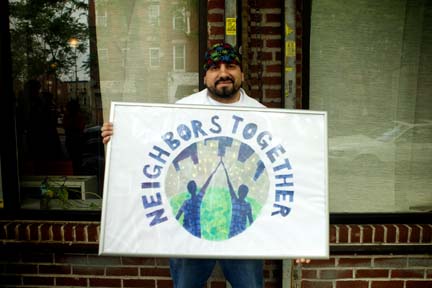Nourishing Connections is a new project from the National Hunger Clearinghouse that connects emergency food providers to resources and helps bring together like-minded organizations to foster shared learning. One of our goals is to support building connections between emergency food providers that will share resources, best practices, and ideas leading to greater unity between food banking and community food security. An equally important goal is to create spaces for dialogue about the role emergency food providers can play in achieving community food security and addressing the root causes of poverty.
One of our core approaches in Nourishing Connections is the Community Learning Project (CLP), a one-year peer-to-peer learning exchange which facilitates knowledge and resource sharing and builds institutional capacity for emergency food providers in the community food security/food justice movement. Our first CLP pair has connected Neighbors Together (New York, NY) and Mother Hubbard’s Cupboard (Bloomington, Indiana) around community organizing, client advocacy, gardening and food justice in the emergency food system.
 MHC staff in front of the organization’s food pantry. Photo by Josh Franer.
MHC staff in front of the organization’s food pantry. Photo by Josh Franer.
Here are Mother Hubbard’s Cupboard’s reflections on their recent site visit to Neighbors Together in February, originally posted on MHC’s blog:
As a part of Why Hunger’s Nourishing Connections Community Learning Project, Mother Hubbard’s Cupboard (MHC) is engaged in a peer-to-peer learning experience with Neighbors Together (NT), a Brooklyn emergency food provider with a mission to alleviate poverty and hunger. This past week, MHC staff Stephanie Solomon and Brandon Shurr visited with Neighbors Together for an in-depth look at their innovative advocacy work.
Beyond offering hot meals, NT has caseworkers on site to build community connections to available resources as well as community organizing around neighborhood issues of poverty and hunger. MHC’s visit came just in time for us to attend a member meeting with discussions about New York state legislation that would potentially affect NT members. They were preparing for NT’s annual Lobby Day, coming up in March, when members and staff head to Albany to advocate around issues of poverty and hunger. We were extremely impressed by the cohesion of the community and the strong voices involved in the member meeting.
 Sandro Ortega, Neighbors Together Café operations coordinator. Photo by Josh Franer.
Sandro Ortega, Neighbors Together Café operations coordinator. Photo by Josh Franer.
We used the time with Neighbors Together to learn more about their membership model, and specifically, how they create space for members to engage in advocacy. We also took time to learn about NT’s Leadership Development Series, which is an intensive leadership training focused on equipping participants with the knowledge and communication skills needed for community organizing. Our visit with Neighbors Together fortified us with the background and inspiration needed to organize back in Bloomington.
In talks with NT back in August, MHC was inspired to begin our own community meetings, which we now offer monthly, to create a space for Hub community members to come together and discuss important pantry issues. We call them our Hub Family Meetings, and already they have been a space where the Mother Hubbard’s community can come together and come up with solutions that make our programs more inclusive and in line with our vision and values.
While in New York City, we had the opportunity to visit two additional community-based organizations, the Brooklyn Food Coalition and the New York Common Pantry. We were blown away by the success the Brooklyn Food Coalition had in advocating for changes in the nutritional quality of school food and the focus on nutritional standards in the New York Common Pantry. Our whirlwind week of visiting with innovative players in the New York food justice movement brought new vigor to our work with Mother Hubbard’s Cupboard.


